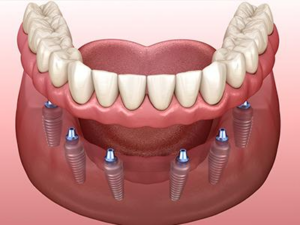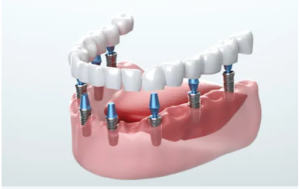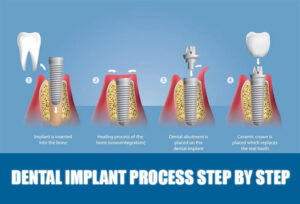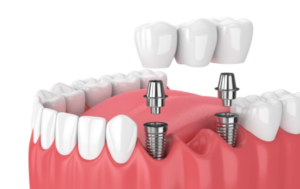Bottom teeth implants are a reliable solution for replacing missing lower teeth. They are anchored in the jawbone, providing stability and mimicking the function of natural teeth. This article will guide you through what bottom teeth implants are, their benefits, the procedure, and what to expect.
Key Takeaways
- Bottom teeth implants provide a stable, permanent solution for missing lower teeth, mimicking natural teeth’s functionality and aesthetics while preventing bone loss.
- The implant procedure includes an initial consultation, implant surgery, healing, and attachment of a custom-made crown, all crucial for long-term success.
- Factors such as oral hygiene, health status, and the selection of a qualified dental professional significantly influence the success rates of bottom teeth implants.
What Are Bottom Teeth Implants?

What sets bottom teeth implants apart from traditional dentures is their ability to:
- Replicate the appearance and functionality of natural teeth by anchoring artificial natural teeth roots into the jawbone.
- Restore your smile as well as important oral functions such as speaking and eating.
- Help prevent adjacent teeth from shifting.
- Maintain jawbone density over time, which is often compromised when teeth are missing for long periods.
Bottom teeth implants help you regain crucial oral functionalities and boost your confidence. They are an excellent choice for those looking for teeth implants reliable and long-lasting solution to replace missing teeth.
Benefits of Bottom Teeth Implants

Bottom teeth implants also restore essential oral functions like speaking, such as eating, and smiling, thereby improving overall functionality. Patients with implant supported dentures report improved speech clarity and increased confidence, which can significantly enhance their quality of life. The implants mimic natural teeth so well that you’ll hardly notice the difference, allowing you to enjoy your favorite foods and speak without hesitation. Full mouth dental implants provide a similar solution for those seeking to replace missing teeth and support neighboring teeth.
Aesthetics play a vital role as well. Bottom teeth implants provide a captivating smile, which can lead to increased confidence and a better self-image. Unlike traditional dentures, which can sometimes look artificial, implants are designed to blend seamlessly with your natural teeth, giving you a natural and attractive smile.
The Procedure for Bottom Teeth Implants

Initial Consultation and Planning
The journey to getting bottom teeth implants begins with an initial consultation and planning session. During this stage:
- Your overall health is thoroughly assessed.
- Your dental condition is evaluated.
- The state of your jawbone is examined to ensure suitability for the procedure.
Determining if your jawbone can support the implant is vital for the success of the surgery.
General dentists and prosthodontists, as skilled practitioners, usually conduct these evaluations and a trained dentist evaluates to develop a treatment plan tailored to your specific needs. This plan will guide the entire process, ensuring that each step is carefully coordinated to achieve the best possible outcome.
Implant Surgery and Healing
The next stage is the implant surgery itself. The procedure involves implanting a titanium post into the jawbone. This post acts as the new tooth root and supports the surrounding tooth roots. A small surgical incision is made, and local anesthesia is used to minimize discomfort during the surgery, making the process as smooth as possible.
Once the post is in place, the healing period begins, during which osseointegration occurs. This is the process where the titanium post integrates with the jawbone, creating a stable foundation for the artificial tooth. Healing can take several months, but this period is crucial for the long-term success of the implant. The titanium screw needs time to ensure that the implant fully integrates with the bone, ensuring that the implant will be as strong and reliable as natural teeth.
Attaching the Custom-Made Crown
The final step in the bottom teeth implant process is attaching the custom-made crown. After the implant has fully healed and integrated with the jawbone, an abutment is attached to link the implant to the custom-made crown. This crown is designed to resemble your natural tooth closely, providing a seamless and natural look.
The custom-made crown is crafted to match the color, shape, and size of your existing teeth, ensuring that it blends in perfectly. This final step restores the appearance of your smile and also the restores the function of the missing tooth, allowing you to eat, speak, and smile confidently.
Factors Influencing Success Rates

Maintaining good oral hygiene for longevity and success of the implants
- Regular brushing
- Flossing
- Attending follow-up appointments to help prevent infections and ensure that the implants remain in good condition.
Health status is another crucial factor affecting dental implant success:
- Systemic conditions like diabetes and smoking can negatively impact success rates.
- Patients with these conditions need to manage them effectively to increase the chances of a successful implant.
- The quality of the bone where the implant is placed plays a significant role.
- Poor bone quality or insufficient bone density can lead to implant failure.
- A thorough evaluation during the initial consultation is important to assess these factors.
The specific region of the mouth, the implant’s diameter, and the patient’s age can also influence success rates. For instance:
- Narrower implants have higher failure rates.
- Implants in certain areas of the mouth have higher failure rates.
- Older patients tend to experience higher rates of implant failure.
These factors are crucial to consider when planning the procedure.
Choosing the Right Dental Professional

When selecting a dentist, it is essential to:
- Conduct thorough research and seek recommendations from trusted sources.
- Verify the dentist’s credentials and experience, including their education and the number of implant procedures they have performed.
- Consider the dentist’s specialization.
- Assess their use of modern technology, as dental implants choosing the right professional for dental implant surgery requires specific training and expertise.
Scheduling a consultation allows you to gauge the dentist’s approach and communication style while addressing any concerns you might have. Discussing costs and payment options upfront can also help you understand the financial implications of the procedure, ensuring there are no surprises down the line.
Post-Procedure Care
Proper post-procedure care is essential for the success and longevity of bottom teeth implants. Key care steps include:
- Resting and avoiding physical exertion for at least 48 hours after surgery to help reduce swelling and discomfort.
- Applying an ice pack intermittently during the first 24 hours to manage swelling.
- Managing minor bleeding by maintaining pressure on gauze during the initial recovery period.
Diet plays a significant role in the healing process. Recommendations include:
- Consuming soft foods and staying hydrated to prevent irritation and support recovery.
- Avoiding hard or sticky foods to minimize discomfort.
- Beginning gentle brushing around the implant site shortly after surgery, using a soft-bristled toothbrush to avoid irritation.
- Using a warm saltwater rinse frequently to help reduce bacteria and promote healing with a proper diet.
Regular dental check-ups are crucial to monitor the health of the implants and the surrounding gum tissue, as well as to maintain good gum health and oral health. Regular follow-ups with your dentist allow for early detection of potential issues and ensure that the implants remain in good condition.
Potential Complications and Solutions
While bottom teeth implants offer a permanent solution to missing teeth, they are not without potential complications. Infection and implant failure are among the most common issues that can arise. Diligent oral hygiene is crucial to prevent gum disease around dental implants. Addressing any signs of discomfort or complications early is crucial for avoiding more severe issues down the line.
In some cases, implant failure may occur due to insufficient bone density, necessitating bone grafting techniques to provide a stable foundation for the implant. Smoking is another factor that can increase the risk of complications, including infection and implant failure. Patients who smoke are advised to quit or reduce their smoking habits to improve the success rates of their implants.
Awareness of these complications and taking proactive steps can help minimize discomfort and ensure the long-term success of bottom teeth implants.
Why Consider Bottom Teeth Implants in Rockville MD?

Additionally, choosing a professional for your implants can make follow-ups and ongoing support more convenient. Access to advanced dental technology and facilities in your area can further enhance the success of implant dentistry surgeries, ensuring that you receive the best possible care.
Summary
Bottom teeth implants offer a reliable and permanent solution for replacing missing teeth, restoring essential oral functions, and enhancing aesthetics. By understanding the procedure, benefits, and factors influencing success rates, patients can make informed decisions about their dental health. Choosing the right dental professional and adhering to post-procedure care are crucial for the long-term success of the implants.
In summary, bottom teeth implants can significantly improve your quality of life by providing a stable, natural-looking, and functional replacement for missing teeth. With the right care and professional guidance, you can enjoy a confident smile and better oral health for years to come.
Frequently Asked Questions
What are bottom teeth implants?
Bottom teeth implants offer a permanent and stable solution for replacing missing lower teeth by being anchored securely into the jawbone. They effectively restore both function and appearance, enhancing your dental health.
What are the benefits of bottom teeth implants?
Bottom teeth implants maintain bone density, restore oral functions, improve aesthetics, and enhance confidence. These benefits contribute to overall oral health and well-being.
What does the implant procedure involve?
The implant procedure involves an initial consultation, the surgical placement of a titanium post, a healing period, and the eventual attachment of a custom-made crown. This process ensures a strong and functional replacement for missing teeth.
What factors influence the success rates of bottom teeth implants?
The success rates of bottom teeth implants are primarily influenced by oral hygiene, overall health, bone quality, and the specific location within the mouth for the implant. Ensuring optimal conditions in these areas can significantly enhance the likelihood of a successful outcome.
How do I choose the right dental professional for implants?
To choose the right dental professional for implants, conduct thorough research on their credentials, specialization, and technology used, and schedule a consultation to evaluate their approach. This will ensure you make an informed decision for your dental needs.
